This is a particularly violent episode. So far, the Return hasn’t shied away from grisly deaths. However, this episode does feature a particularly remarkable one, for several reasons to be seen shortly. Nonetheless, this narrative edge is an indication of a new social aesthetic seeping from the outside into Twin Peaks, as a place and even a social entity or paradigm. The violence becomes one of abstract concepts, of the present forcing its cynicism into the town as we knew it. But it’d be mere decay to see darkness encroaching in without a suitable opposite pushing back. It’s no such case here. No dynamic is without an opposite and no tone is without some subversion.
Home Under Fire
Dale Cooper’s current state raises some uncomfortable questions that often yield even more uncomfortable answers. The most harmless of these is whether or not he’ll know how to return home after his first day at Dougie’s job. Today, we start the episode with an answer to that question: he doesn’t. Fortunately, the same officer that had told him not to loiter has come back. For all the quirkiness the new characters lack in contrast to the classics, many seem pretty far from common sense as hardly anyone has been able to tell that something is deeply and perhaps perilously wrong with ‘Dougie’. The officer actually bothers to ask whether Coop is under the influence of any substance. Nonetheless, he still exhibits some remarkable patience when bringing ‘Dougie’ back home to ‘his’ wife.
Now, Janey-E has started to become another fan favourite, next to saintly Jade. Reasonably so, as despite her occasional short fuse with her ‘husband’, her growing concern about her spouse is legitimate. Seeing some effort to maintain a healthy family nucleus is a breath of fresh air in a series that’s painted a less than hopeful image around families. Furthermore, Sonny Jim is also a strong factor in this stability, and he also brings out some of Cooper’s best instincts. However, outside intervention menaces to undermine this union as Janey-E receives a mysterious envelope. This contains a picture of Dougie… with Jade. Coop knows her as a kind presence, but Janey-E sees this as infidelity. She’s not wrong, as the actual Dougie did often employ Jade’s services.
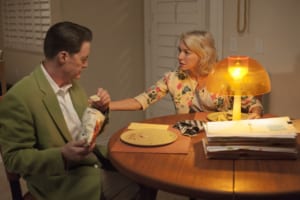
The huge difference in discourse between both Cooper and Janey-E makes for a moment that is both tense and amusing. A phone call shortly after from an unknown party sets a strong mark on the extortion intent via incriminating picture. However, Janey-E is no shrinking violet, as she answers the phone and quickly takes the reins of the deal. She will be the one to make the payment (using Coop’s astounding winnings at the casino) at a place of her choice. At the end of the call, she chastises unwitting Coop about Dougie’s actions, which may jeopardise the entire family. In times of trouble, great fortitude is needed, and Janey-E has that and then some. Despite such a harrowing day and the pain of deceit, her anger subsides.
Interestingly, the sorrowful kiss she plants on Cooper’s head gets a subtle reaction out of him. It’s almost as if some long-slumbering nature had been stirred. Perhaps this, next to Sonny Jim’s thumbs up and the wholesome taste of coffee will slowly bring Coop back.
Beneath the Surface of the Apparent
From back in the original series, the traffic lights swaying with the wind at night have been a visual cue. Usually to set the tone for loneliness, or to ominously signal the presence of dangerous, evil parties. This also proves an efficient way to introduce the uncanny into the mundane: a vision of the Black Lodge. Whether or not Coop is able to fully grasp it, MIKE is urging him to wake up and not to die. Cooper seems to understand these messages on some level. First by winning thirty consecutive mega jackpots, then by knowing the falsehood about a co-worker. And now, by drawing some strange patterns, ladders and staircases, on the case files his boss, former boxer Bushnell Mullins (Don Murray), told him to work on. Given the latest turn of events, there is room to fear ‘Dougie’ may lose his job.
However, this is a remarkable moment in a narrative permeated by silence. Angelo Badalamenti’s soothing, jazzy score (OH, ANGELO) imbues this process with a relevance beyond common comprehension. Whichever the actual coherence or risks to this message conveyed from the Black Lodge, ‘Dougie’ brings his homework to his boss the following day. Safe to say, it’s not only the boss who has eyes on him. The man Coop recognised as a liar last episode is also looking pretty restless. As one would expect, the company’s owner regards Cooper’s work as childish dribbles. However, as the music sinks back into the scene, a peculiar understanding dawns on Mullins.
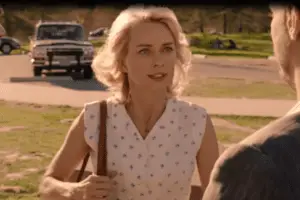
The odd patterns Cooper drew on the case files bear a special significance, which is unknown to the viewer. Regardless, Mullins very much appreciates what ‘Dougie’ did. And it a most unlikely turn of events, the clueless, vulnerable agent has earned the respect of his boss, which matters aplenty in a place as merciless as the insurance business. Considering the erratic and seemingly arbitrary distribution of the drawings, there is very little chance we’ll ever actually know what they mean. So, we may have on our hands a tint of quirkiness surrounding the monolithic and imposing figure of the boss, as a character. Only time will tell. Alas, it’s clear that a now more enthusiastic Cooper just has a way to win over people, mentally catatonic or not.
In a similar way, Janey-E also comes out victorious that following day. However, whereas Cooper had the aid of the Black Lodge, Janey-E has her very own grit and agency. She meets up with the people Dougie has become indebted to. But she won’t have that, as she fiercely explains her family’s inability to pay the full amount. This is some clear panache on her part. So she pays only the amount that Dougie owed when making such a gamble without her knowledge or consent, plus interest. $25,000. The end result is the two henchmen get some money and a scold from Janey-E. It’s an ultra quotable moment and I strongly advise watching it as the context can be pretty flexible. That drop of the mic is bedrock, cold and heavy.
Snatched
Meanwhile, back in Twin Peaks, Richard Horne meets up with cocaine dealer and leaner version of Henry Rollins, Red (Balthazar Getty). Now, Red is quite a character – he chews a lot of the scene through his very body language, and not even his customer quite knows what he’s about. In fact, he’s as slick as he’s menacing, in a similar but more composed vein as Mr. Eddy in Lost Highway. And he’s also a bewildering coin-trick magician, because why the fuck not. Naturally, this combination freaks Richard out, which is nice because we loath him. It’s also lovely because Richard is something of an embodiment of fragile and toxic masculinity. He gets on by sexually-assaulting and bullying, but he quickly sparks in anger at being dismissed as a kid by Red.
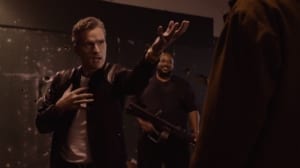
Thusly, Red’s more-than-credible threats and condescension have him quivering long after the transaction. This, along with the effect of the cocaine, will prove a ruinous combination within a few moments. We do get a little bit of a respite by a giggly scene at the Double R Diner. But even that fails to prepare for a rather controversial moment in the series. Wounded ego and coked up to the gills, Richard Horne speeds his truck recklessly to prove to himself that he’s a not a kid. This results in him graphically running over and killing a boy. The entire setup to the scene, music, and witness placement is appropriately horrifying. It’s not the first time Twin Peaks has shown on-screen death. However, some argue whether or not such heinous act was necessary to establish Richard Horne as an irredeemable character or mere vulgar shock value.
Regardless, the focus of the scene is on neither criminal (who obviously drove away) nor victim. Rather a witness of the incident: Carl Rodd, owner of the Fat Trout Trailer Park from Fire Walk With Me. He comes every week to Twin Peaks to have a coffee and a smoke in the park, as I do. As the mother wails for her son, Carl sees a golden aura emerge from him and soar above to the sky. He reasons that the boy’s soul is rising towards God, after which he goes to comfort the mother. In spite of the terrible event, the most important thing in this scene is the fact that Carl could see this. Going back to FWWM, we ought to remember that one of the trailers in the park belonged to a denizen of the other side.
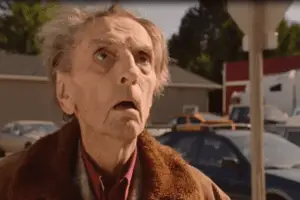
Furthermore, the novel The Secret History of Twin Peaks reveals that he’s been to a fair share of strange places, as he disappeared into the woods surrounding Twin Peaks as a child. Perhaps he too can, to some degree, experience or sense things that do not exactly belong to reality as we traditionally understand it. It is possible that this apprehension of the strangeness may see him make another appearance in future episodes. Something else to consider is the electrical buzzing on a nearby utility pole marked with the number 6. Since electrical current has become a motif related to doppelgangers on this season, the child’s death may have still another purpose.
OH NO, MR. SPIKE
In Vegas, we drop by once more at Duncan Todd’s office, whom we last saw back in Episode 2. The knowledge that he works for a fearsome individual planted the thought that he may be an underling to Mr. C. This is further hinted by a strange message he receives. This prompts him to extract an envelope from his safe, marked with a black spot. Somewhere else, hitman Ike “The Spike” Stadter (Christophe Zajac-Denek) receives a similar envelope, which contains pictures of both Dougie Jones and Lorraine (from last episode). It’s intensely clear that somebody wants these two very, very dead. And when you want somebody that dead, you know who to call. OH NO, MR. SPIKE.
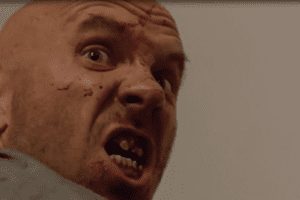
In spite (or in spike) of the seriousness of the situation, the coming death is delivered with some tone-breaking humour. This is mostly because of the ambience constructed around the character. As soon as you hear his unofficial theme, “I Am” (Old School Hip-Hop Beat) by BluntedBeatz, you know he’s coming, which may potentially break any ambience. In fact, this theme plays as he brutally kills Lorraine, as well as several of her co workers. As if the boy’s death wasn’t enough in terms of controversy, this one also isn’t easy to handle. Although it is nowhere nearly as vile as when Cooper’s doppelganger killed Darya, it’s still monstrous because of the sheer savagery of it.
And even then, the tone of the scene becomes a little broken at seeing him express sorrow over how he bent his ice-pick. The physicality, the feel and deeds of the character are all a mutating mass, where the viewer may struggle to know how to even process the scene. This is either brilliance or odd for the hell of it; mileage always varies. Personally, I lean towards the former.
The Silence Replies
In the meantime, we join Special Agent Albert Rosenfield on a dark, rainy night in the city. He’s on the way to meeting up with a mysterious individual who may know something about Agent Cooper. As he walks to the Max Von’s Bar, he humorously declares his displeasure about such heavy rain. Little do we know by this moment, this is a fitting preface to the nature of the encounter to come. As he makes his way through the bar’s patrons, the viewer may theorise on who he’ll be meeting. By the sound of the foreshadowing two episodes ago, we may be supposed to know who he talks about. I’m sure many were holding their breaths for a beloved fan favourite, but this person doesn’t look familiar at all. That’s because we never saw her face at all back then, but she was there alright, from the beginning.
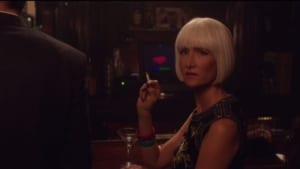
Meet Diane Evans (Laura Dern). Agent Dale Cooper’s former secretary. I know many (including me) expected or hoped that the unknown party Agent Rosenfield was meaning to contact would be Audrey Horne. However, with such a twist, we got both a peculiar appeal to nostalgia, as well as a gaze upon a ‘new’ character. The fact that we won’t get to hear what she has to say until next episode maintains the mystique for a little longer. However, the circumstances surrounding her suggest a bleak outlook. In a way, she was very intimate with Special Agent Dale Cooper, being the recipient for all his observations throughout Laura Palmer’s case. There is no telling if his disappearance, and Mr. C’s presence in his stead bore any consequences on Diane.
Still on the themes that hit close, we’re back in Twin Peaks. We join Hawk in the rest room, a most unassuming place for a vital discovery. A coin falls from his pocket and rolls towards a stall. The ambience grows a little oppressive as he picks up the coin, which features the image of a Nez Percé chief. This is indeed something related to his heritage, as Margaret had put it back in the first episode. This curious circumstance leads his eyes to the stall’s door, which is slightly split down the middle. Hawk decides to use tools to disassemble the stall’s door. And lo and behold, he finds something hidden inside it. Pages, and they look like they belong to a diary.

The episode comes to a close once more at the Bang Bang Bar. Today we’ll get to wipe the blood off our minds with lovely Sharon van Etten’s “Tarifa“. Some episodes aren’t easy because of their ambiguity or cryptic feel. Some others are hard because of the cold dose of reality that some people just want to abuse and harm others. Ranging from the sheer pragmatism in method of Spike, the vile recklessness of Richard, to the modern callousness of Chad. The latter, by the way, mocked Doris’ nagging her husband, the Sheriff, while utterly disregarding the reasons for it: that her son had committed suicide. As her character crossed from a caricature to an individual marred by loss, you can always find somebody to deny all its worth.
On dreadful times, the narrative of life and fiction can be reduced to a relation of predator and prey, for all the wrong reasons. But ultimately, these hatred sinks do prove effective narrative vehicles, if only for the sake of catharsis at seeing them fall. Nonetheless, we have some valuables to lead us hopefully to the next episode, to the unveiling of a mystery and listening to one who always listened. For a delivery that has made even the very silence feel relevant, this is certainly quite a payoff. However, it’s still pretty early. There’s a lot of room for pain and sorrow yet.
Do stay tuned, lovelies.

